Larry Osweiler grew up in Keota, Iowa and now lives in Indiana. A graduate of the University of Iowa, he is an aficionado of Iowa treats found nowhere else: Pagliai’s Pizza, Sterzing Potato Chips, Maid-Rite’s, and kolaches from anywhere close to Cedar Rapids.
I got interested in Iowa politics in 1964 at the age of 8, when Governor Harold Hughes was running for re-election. I had sent for a picture of the governor and received a package from his office a few weeks later. I remember showing it to everyone on the school bus.
While waiting on the bus one afternoon, I remember Evan Hultman riding by on the back of a convertible with a Hultman for Governor sign on it. Hughes won with 68 percent of the vote. Hard to believe there was once a day when a Democrat would win a statewide race in Iowa by that large a margin.
I studied the book I’d received and memorized almost every state official. John Schmidhauser was elected to Congress from the first district. At our dinner table that election night, I wondered how my dad was so sure Lyndon Johnson was going to win the presidential election.
FIRST VISITS TO THE CAPITOL
I made my first trip to Des Moines in 1965. It was State Fair time. My father had promised to take me to the “State House.” We stayed at the Savery Hotel downtown. That Saturday afternoon, Dad, Mom, and I traveled to the capitol on the hill.
I was in awe of the building. I knew every monument on the grounds after memorizing those details in the book the governor’s office had sent to me.
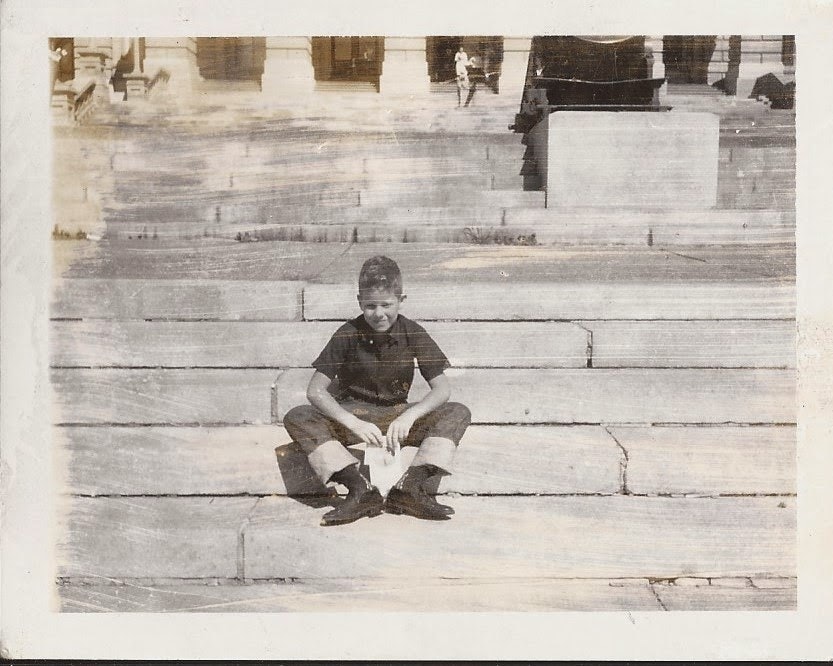
Larry Osweiler on the west steps outside the capitol in August 1965
The next day, we went to my first Iowa State Fair. I remember the disappointment on my father’s face when the Andy Williams concert was sold out. The pictures Dad took that day with his new Polaroid camera were the last ones he ever took of me. He tragically passed away on December 4, 1965 in an automobile accident.
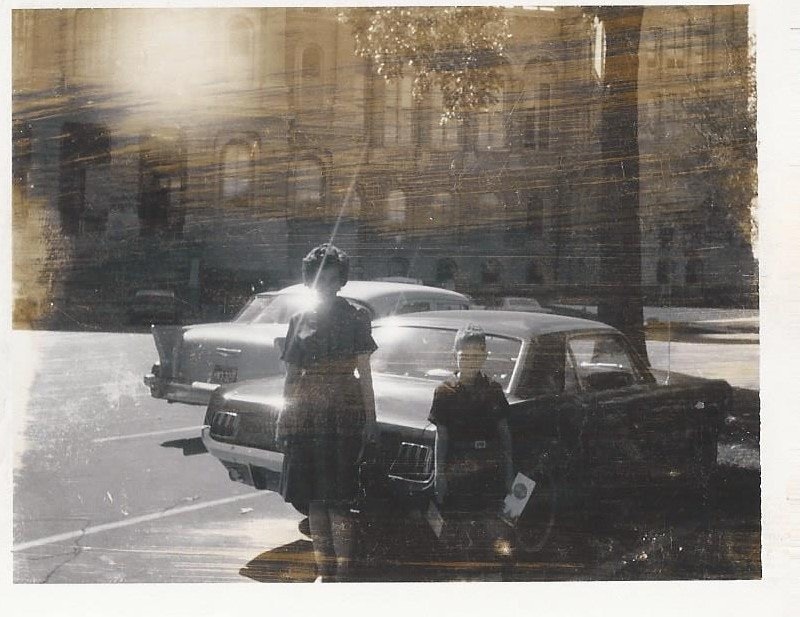
Larry Osweiler and his mother in Des Moines, August 1965
The next year, I traveled to Webster City to spend two weeks with my dad’s older brother, who owned a women’s clothing store. That store is still there today, with stores in two additional cities. Uncle Paul was a father figure to me after my dad was gone. After I pestered him repeatedly, he took me to Des Moines in July 1966 to tour the capitol grounds.
I remember the long underground tunnel between the capitol and the state office building, the huge legislative chambers, and the trip to the top of the dome. Yes, you could walk all the way up. I remember the long winding stairs and the long stairs up the side of the dome. The view from the top was amazing.
I got my picture taken next to Governor Hughes’ limo.
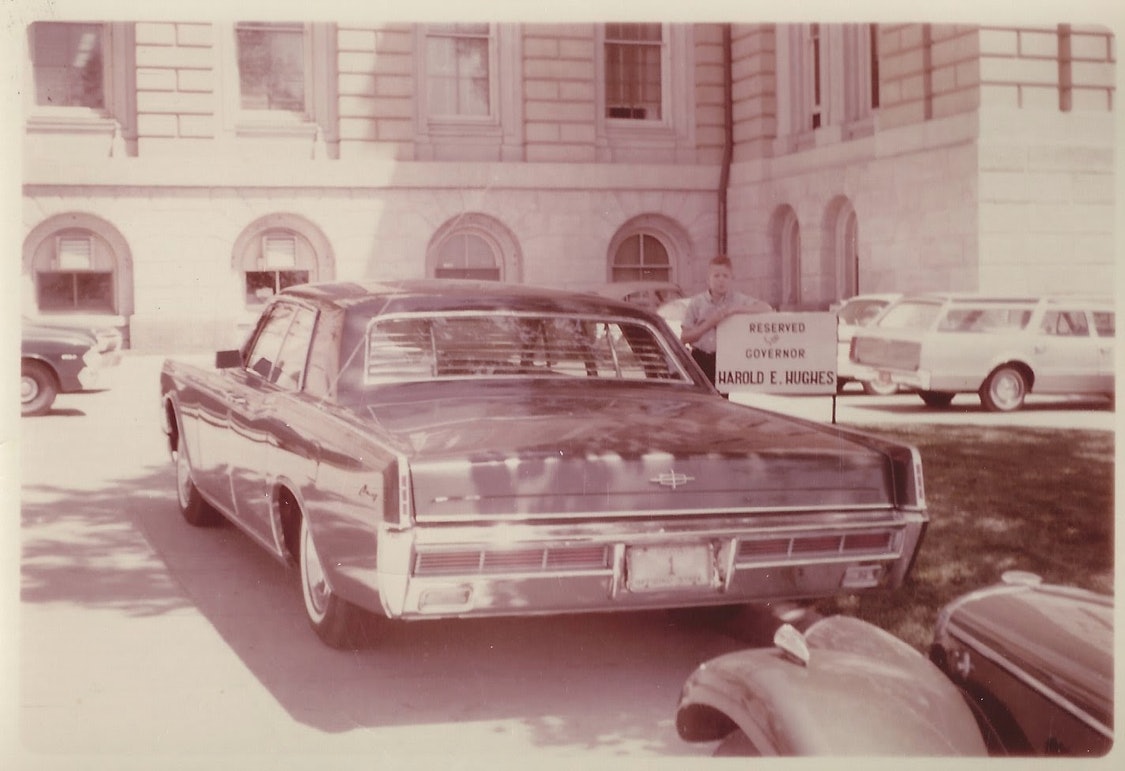
Larry Osweiler in July 1966
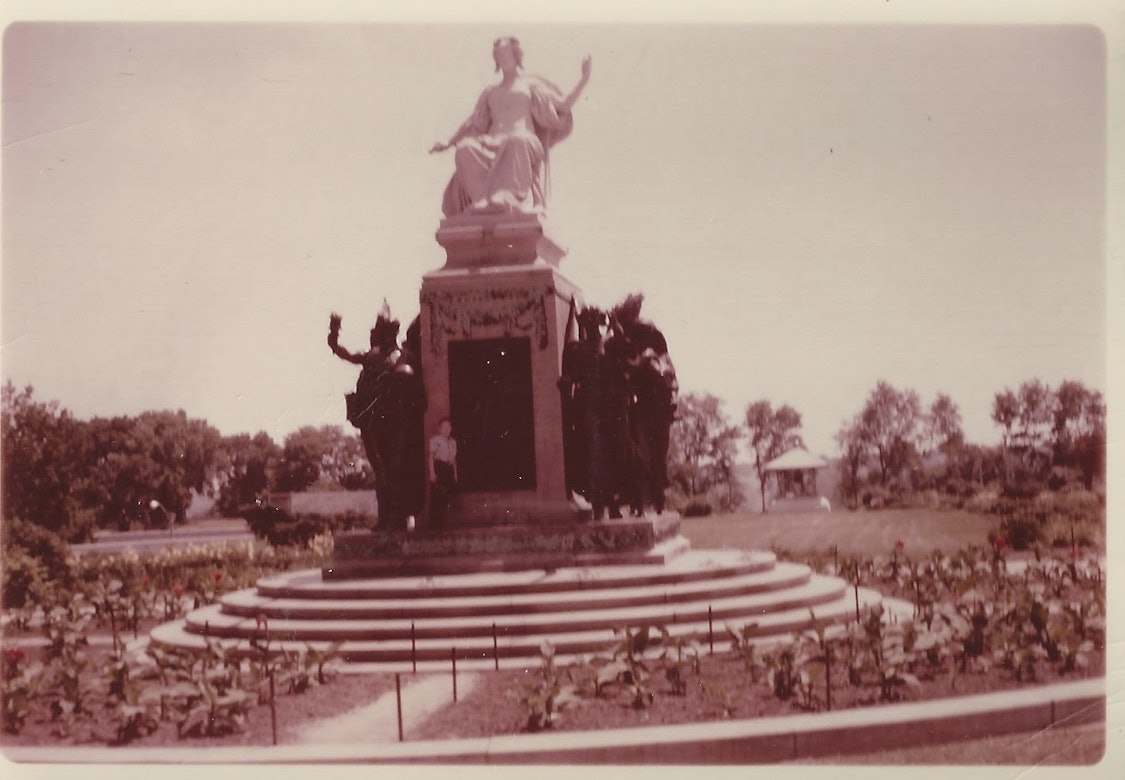
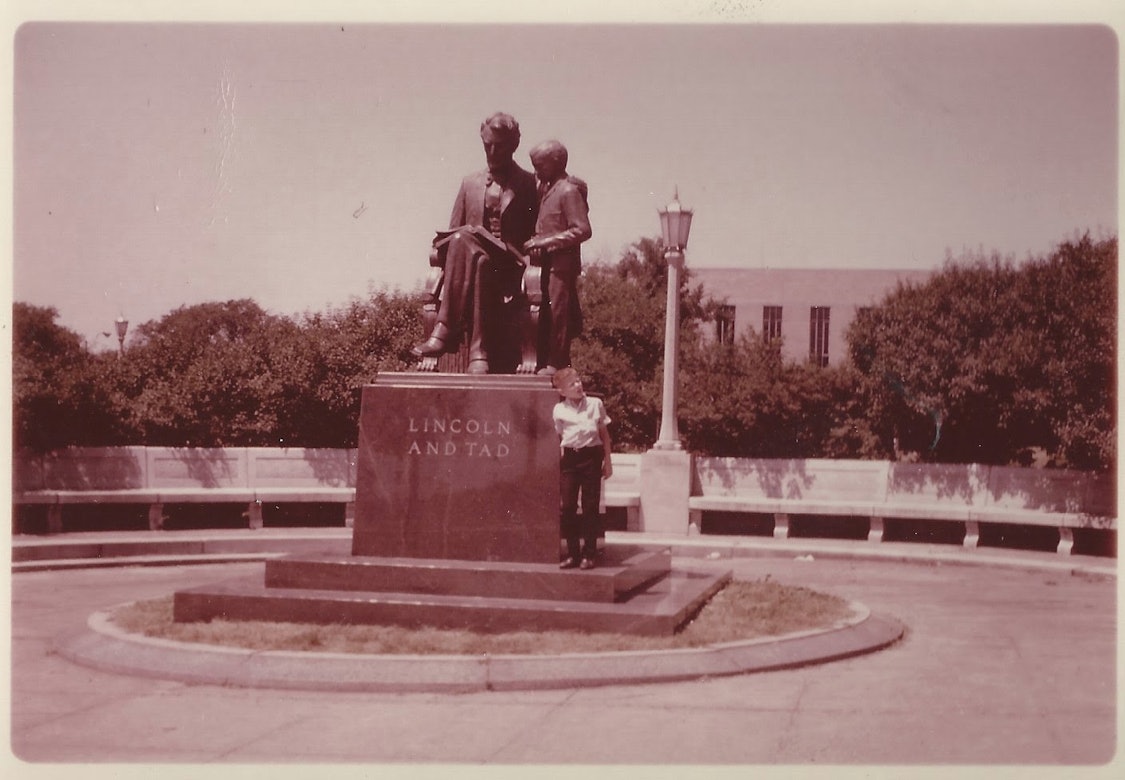
The downtown Des Moines skyline (as viewed from the west side of the capitol) looked quite different in those days.
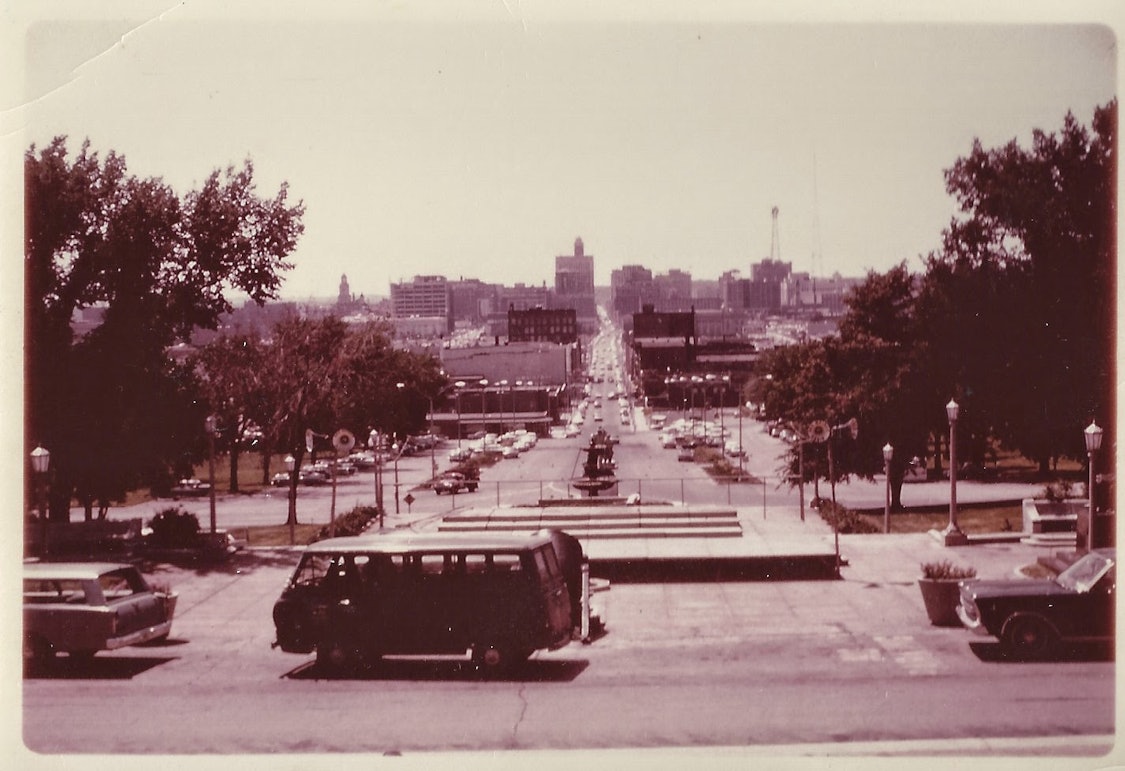
We walked inside and into the Governor’s Office waiting area, and my uncle asked if the governor was in. The receptionist remarked that he would be leaving at noon. So we hurried around the corner and waited outside his office door. A few minutes later, Governor Hughes emerged and walked over to shake our hands. He exchanged some small talk with my uncle, who was a die-hard Republican. I didn’t wash my right hand for three days after that.
That afternoon, we walked into the waiting area outside the Attorney General’s office. Lawrence Scalise was in, according to his receptionist. My uncle asked if there was any way we could see him. I remember her walking back to his office, and she came back and said we could go back to see him. My uncle and I had about a half-hour visit with Mr. Scalise.
In 2010, I wrote Lawrence Scalise a letter after finding his business address online. I told him about that visit in 1966, how much that meant to me, and how that simple gesture of kindness made a lasting impact on my life. I told him about my interest in politics in my early years and what I was doing now. At that time, I was living in Saginaw, Michigan.
A few weeks later, I received a phone call. On the other end of the line: “This is Larry Scalise.” We had an amazing visit. He told me how he decided to run for attorney general, the story of the 1966 Republican landslide year (he was not re-elected), and his life of service in the legal profession. Five years after our conversation, he passed away.
ENCOUNTERS WITH IOWA CANDIDATES
In 1968—a year I remember vividly—I got to see Governor Hughes again at a campaign stop in Sigourney. He was running for U.S. Senate at the time. A local member of the Washington County Democratic Party who attended our church invited me to a dinner at the KC Hall in Washington, where Paul Franzenburg would be speaking. He knew I was interested in politics and wanted me to go see a candidate for governor.
I always thought that dreadful jingle from Marilyn Maye got Robert Ray elected. I still know the words by heart. But Robert Fulton got to serve as governor for two weeks (after Hughes was sworn in as senator and before Ray was inaugurated). I’m still amazed the Senate race was as close as it was. Hughes barely defeated David Stanley with 50.25 percent of the vote.
My mother moved us to Marengo in 1969. But before that, my mother had a farm sale to sell off her house furniture and farm equipment. My middle brother, who had just started summer school at Iowa, became friends with a guy who was good friends with William Gannon of Colfax. He was a member of the Iowa House and ran for governor in 1972. Gannon came to our farm sale, and I engaged him in some lively political conversation.
In Marengo, I lived two blocks from the Wanamaker family home. Rick Wanamaker was the local basketball star who attended Drake University, and I would see him at church when he was home on Sundays. Rick got me autographs of the Drake basketball players, but I unfortunately lost that picture. We got to attend a few games at Vets Auditorium to see Drake play during its glory years under Coach Maury John. Rick is now a well-known real estate agent in Des Moines.
Our class took a field trip to Des Moines in 1971. It was my first time sitting in on a legislative session. Roger Jepsen was the lieutenant governor. Later, as a student at the University of Iowa, I became good friends with his son—though he could not interest me in GOP politics. I remember the weird feeling when Jepsen came out to greet our class. It felt like Republicans had taken our building away from us. But I realized in later years that it was the people’s house, and didn’t belong to one party.
I attended my first Democratic state convention 1972. Some friends of ours were convention delegates and wanted me to tag along. They told me I could come if I volunteered as a page. I got to meet every important politician that day. A great visit with Dick Clark, who was running for the U.S. Senate. John Tapscott was there, along with Paul Franzenburg, who were both running for governor. I never cared for the dreadful straw hat I had to wear, though.
A SEVEN-WEEK COURSE IN SOCIAL JUSTICE
At that state convention, people at a McGovern for President booth were recruiting volunteers to travel to California to work for Senator McGovern in the run-up to the California primary. $66 would get you a round-trip bus ride to somewhere in California, where you would stay with a host family for two weeks.
That sounded really cool to my 15-year-old self. Despite my mother’s reservations, a few weeks later she took me to Des Moines, where I boarded a bus to California with other teenagers. We filled up the bus in Columbus, Nebraska, picking up about 30 more people.
I had never been to California. I ended up staying for seven weeks and paid for my own airfare back to Iowa by working outside doing landscaping for a labor union hall in Bakersfield.
I got to shake hands with George McGovern, handed out leaflets in poor neighborhoods, and got kicked out of a fine arts center parking lot for handing out leaflets to wealthy Republicans in tuxedos and cocktail dresses. I never figured out why they made us hand out leaflets to them, since they wouldn’t be voting in the Democratic Primary. I also got to see my first Dodgers baseball game.
The father of my host family was a union steward. I learned a lot about the union of typesetters, who were employed by the newspapers in the area, and much about the plight of the farm workers and what Cesar Chavez was doing. The whole experience was a great seven-week course in social justice.
UNIVERSITY LIFE AND THE IOWA CAUCUSES
1974 comes, and on to the University of Iowa. That first semester, I took a political science class. The most fun I had was organizing a “Dale Bumpers for President” group, which took over the mock convention we had to participate in. I can’t remember why Dale Bumpers (an Arkansas governor and later U.S. senator) was our guy, but he seemed to be the popular choice at the time.
I met John Culver (who was running for Iowa’s U.S. Senate seat) at a rally and remember telling him not to forget the farm workers. He told me he would not forget them. Jim Schaben, who was running for governor, had a rally on the Pentacrest. Democrat Edward Mezvinsky and Republican Jim Leach, both running for Congress, came to our dorm. Leach was the first Republican I ever voted for. For some reason, the guy really impressed me.
1975 was another year that impacted me, in a different way. The Vietnam War was over, and refugees were seeking new homes in the U.S. I remember Governor Ray allowed hundreds of these “boat people,” as we called them, to settle in Iowa and become citizens. I remember the opposition—mainly from people in his own party—to his gesture. Ray’s policies toward those refugees told me that kindness, compassion, and doing the right things are not limited to one political party. To this day, I remind people of this story of love for our fellow human beings.
1976 rolled around, and this new thing called the Iowa caucuses came on the scene. As a sophomore at Iowa, I was elected as a precinct delegate to the Johnson County Convention. I won that race 3-0. To this day, it was the only unanimous election I ever experienced.
There was a twist to the reason I became a Carter delegate. In the summer of 1975, my cousin and I went golfing one Sunday at Finkbine Golf Course. As we walked out of the dorm, I saw a “Carter for President” sign by the elevator. I had no clue who the guy was, but having an interest in anything political, I was up for this.
After 18 holes of golf, I returned in my sweaty outfit, consisting of a soaked polo and cut-off jean shorts. I’m sure I was also wearing stylish 70’s tube socks with that. I walk over to the Student Union and into this conference room. Standing there by himself was this short guy with a suit. He looked like the guy on the poster, so I figured I had the right guy. I walk up to this man; he sticks out his hand and says, “Hi, I’m Jimmy Carter, and I’m running for president.”
Governor Carter and I talked for about ten minutes. He told me about his family, his peanut business, and his vision for the future. Little did I know that he would be elected president the next year. The only other political event I went to before the 1976 caucuses was a rally for Mo Udall, a member of Congress from Arizona.
I got to meet Chip Carter when his dad was running for re-election in 1980. The same year, I met then U.S. Representative Tom Harkin in western Iowa.
The story continues. I was now busy working and raising a family. I never missed a caucus until we moved out of state in 1999.
I wanted to share these memories as a reminder of better times. People would disagree about political and social issues but rarely got nasty. You could put a Nixon or Humphrey bumper sticker on your vehicle without fear of ridicule or violence. Families or family dinners would not be torn apart by politics. There were Democrats and Republicans who were good people.
I learned way too late in life that one needs to make an effort to try to find the good in people.
Editor’s note from Laura Belin: In this 2010 video, Marilyn Maye explained how she came to record a campaign song for Robert Ray, altering some lyrics from a show tune.

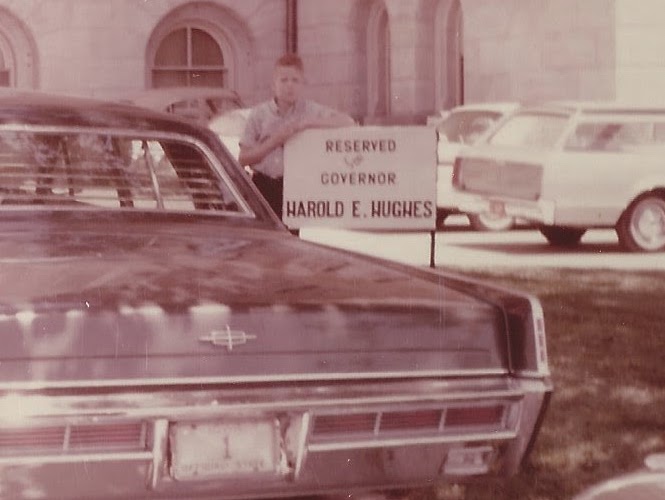
2 Comments
wonderful article
Great article! Harold Hughes was an icon. Governor, US Senator, and candidate for president. He was a man of the people, as blue collar as they get. He served back when we had a real Iowa Democratic Party and not the biology denying “wokefest” that it has become. Highly recommend his book for the younger readers who likely have never heard of him
ModerateDem Sat 3 Jun 8:32 PM
Hi Larry!
Wonderful piece, thanks! My experiences are nowhere near as many as yours, but I did meet Harold Hughes in his office in Washington, DC, when I was a BHS senior. His deep voice and massive desk and kind demeanor (“Go on! Take pictures!”) had me in awe.
I had the job of showing the secret service around the IMU before a visit of George McGovern. We stood in a side door on the north side near the platform next to a noisy crowd. I spoke up so the agent could hear me, telling what I knew of the candidate’s route through the Union, loudly saying, “NOW HE’LL COME IN BEHIND THE STAGE AND THROUGH THIS DOOR.” The agent pulled me back out of the room and said “Keep your voice down!” Oh, right, security, this is. Hope you’re well. Write or call sometime!
monteasbury Mon 12 Jun 9:37 PM